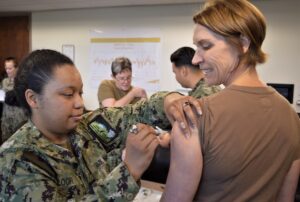
Command population health and environmental health officers attest that immunization remains the primary method of reducing seasonal influenza illness and any potential associated complications. Being vaccinated against the viral threat not only helps protect vaccinated individuals but can assist in protecting family and co-workers by helping reduce the spread of the disease (Official Navy photo by Douglas H Stutz, NHB/NMRTC Bremerton public affairs officer).
Story by Douglas Stutz
Naval Hospital Bremerton/Navy Medicine Readiness and Training Command Bremerton
Get stuck to not get sick.
The influenza vaccination – required for all active duty military personnel, selected Reservists and healthcare workers – shot exercise for tenant commands will be held October 21-22, 2024, at NHB’s Health and Education Center (BHEC), 2850 Thresher Ave, Naval Base Kitsap Bangor, from 8 a.m. to 3 p.m.
The annual influenza vaccination for all eligible family members of active duty and retirees will take place October 23-27, 2024, also at NHB’s BHEC, Wednesday-Friday, from 1 p.m. to 6 p.m., and Saturday and Sunday, from noon until 5 p.m.
There has already been an increase of positive influenza cases of late.
Dr. Dan Frederick, NHB Population Health Officer, emphasizes that immunization remains the primary method of reducing seasonal influenza illness and any potential associated complications. Being vaccinated against the viral threat not only helps protect vaccinated individuals but can assist in protecting family and co-workers by helping reduce the spread of the disease.
“Getting the flu shot helps protect someone once the flu season starts in their community. The vaccination can reduce flu illnesses, doctors’ visits, and missed work and school due to the illness,” Frederick said.
Frederick also emphasizes that just as it is important for military personnel who live and work in close quarters to receive the vaccine, it is also highly recommended for school-aged children.
“Influenza is not the common cold. It can be a life-threatening disease that especially can put specific groups in jeopardy,” explained Frederick. “While certainly people with respiratory conditions, such as asthma and chronic obstructive pulmonary disease (COPD), are at increased risk, those over 65, young children, and pregnant women would be at the top of my list.”
For those who opt to receive their influenza vaccination elsewhere, there are a number of outlets in the surrounding community that accept TRICARE. NHB requests for those who do get their flu shot out in town – especially active duty, selected reserve, and healthcare workers – to provide documentation of receipt to their medical staff, provider, or directly to NHB Immunizations Clinic to update their medical record.
As a contagious respiratory illness, the flu has varying degrees of symptoms, ranging from no symptoms (asymptomatic) to severe symptoms which can develop from one to four days after infection and include such signs as:
• Fever or feeling feverish/chills.
• Cough
• Shortness of breath or difficulty breathing
• Fatigue (tiredness)
• Sore throat
• Runny or stuffy nose
• Muscle pain or body aches
• Headache
• Some people may have vomiting and diarrhea, though more common in children.
There are [also] a number of daily measures which anyone can implement to help protect themselves during cold and flu season.
According to the CDC, along with getting vaccinated, there are a few healthy habits to protect against flu,” said Lt. Anurag Sharma, NHB Preventive Medicine department head and environmental health officer. “Personal hygiene by routinely washing hands thoroughly and appropriately. Avoid close contact. Stay home when sick. Cover your mouth and nose if ill and when coughing or sneezing and avoid touching your eyes, nose or mouth.”